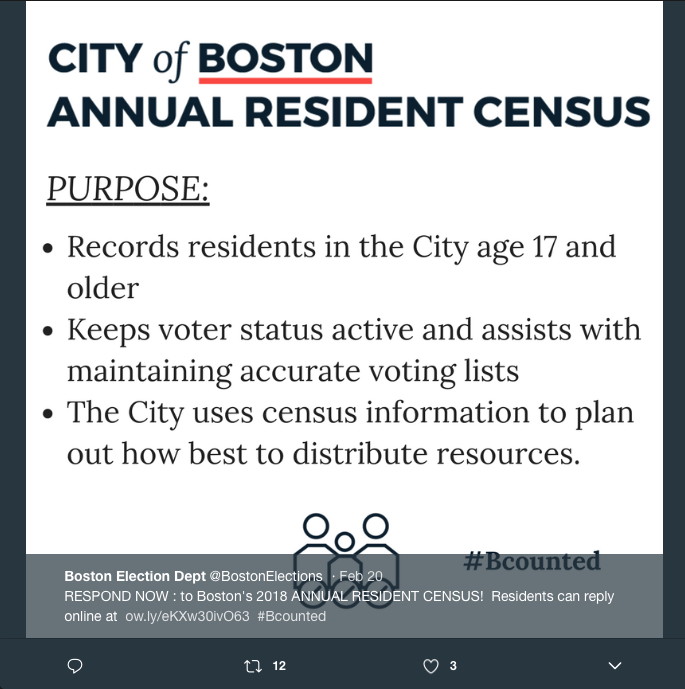
Massachusetts is having a bit of an identity crisis these days. On the one hand, state officials oppose the addition of a citizenship question on the 2020 federal census. On the other hand, Massachusetts continues to require a citizenship question on its own annual state census.
The growing list of Massachusetts officials opposed to a citizenship question on the federal census include:
- Massachusetts Secretary of State William Galvin (opinion piece)
- Massachusetts Attorney General Maura Healey (letter)
- Boston Mayor Marty Walsh (letter)
- Massachusetts congressional representatives Stephen Lynch, William Keating, and James McGovern (letter)
- Massachusetts Senator Elizabeth Warren (letter)
There is an overall concern by these officials that a citizenship question could discourage participation from immigrant communities resulting in an undercount of the population with subsequent reductions in federal resource allocation.
However, Massachusetts is unique in that it is the only state to conduct its own census every year. The state census, formally known as the annual resident listing, asks questions mandated by state law including name, home address, date of birth and "nationality, if not a citizen of the United States..." Residents must respond or face penalties such as fines or prison. All answers are published.
Massachusetts Secretary of State Galvin's office responded to his conflicting positions in an article by noting that the local census is "'merely an information gathering tool' used for voter rolls and jury lists, things the federal census don't have anything to do with." Furthermore, the "... results of someone not being included in the federal census include... less financial support..." in contrast to the state census. Secretary Galvin reinforced this position in an opinion piece he personally wrote.
In other words, Massachusetts is unconcerned if immigrant population are excluded from the state census because non-US citizens cannot vote or serve as jurors. This response also suggests that the state census is neither intended to be comprehensive of all residents nor to be used for making financial decisions like the federal census.
These answers raise two important questions. First, if the purpose of the state census is to collect information on US-citizens, then why is data on non-US citizens collected? The additional data on non-US citizens is not used for any legitimate or articulated reason and the census form could easily just drop the citizenship question by stating "for US citizens only" or something similar.
Second, why is Massachusetts creating a duplicate database of US-citizens based on self-reporting forms when the state already collects verified proof of citizenship for other administrative purposes. The Massachusetts state-wide census is a massive and expensive annual undertaking that uses unconfirmed, self-reporting questionnaires. More reliable information would already be available through established databases such as voter rolls and motor vehicle records.
Unfortunately, some municipalities admit to using state census data for unintended purposes such as resource allocation. The City of Boston's Twitter account openly admits that it "...uses census information to plan on how best to distribute resources" even though the Mayor believes a citizenship question would undercount and harm the immigrant populations.
Towns including Acton, Lowell, Middleton, Reading and many others also report using the state-level data for funding purposes. Such uses do not seem to be supported by the Massachusetts Secretary of State and could result in reduced resource allocation to the most vulnerable populations as state officials believe.
Only one local official, Boston city councilor Josh Zakim, has called for the citizenship question to be removed from the annual resident listing.
In short, Massachusetts officials oppose a citizenship question on the upcoming 2020 U.S. Census but not on their own census. Massachusetts is unable to justify why the state citizenship question is asked and seems unconcerned that non-US citizens may not respond. There are broader questions as to why the state census is conducted at all given the costs and availability of verified administrative databases. Finally, municipalities admit to using the state census for unintended purposes that may harm vulnerable communities.
Massachusetts is now suing the federal government using taxpayer money to stop the addition of a citizenship question on the federal census. It would be worthwhile for the state to first look in the mirror and review its own positions before proceeding with further litigation.


info [at] baystatebreakdown [dot] com